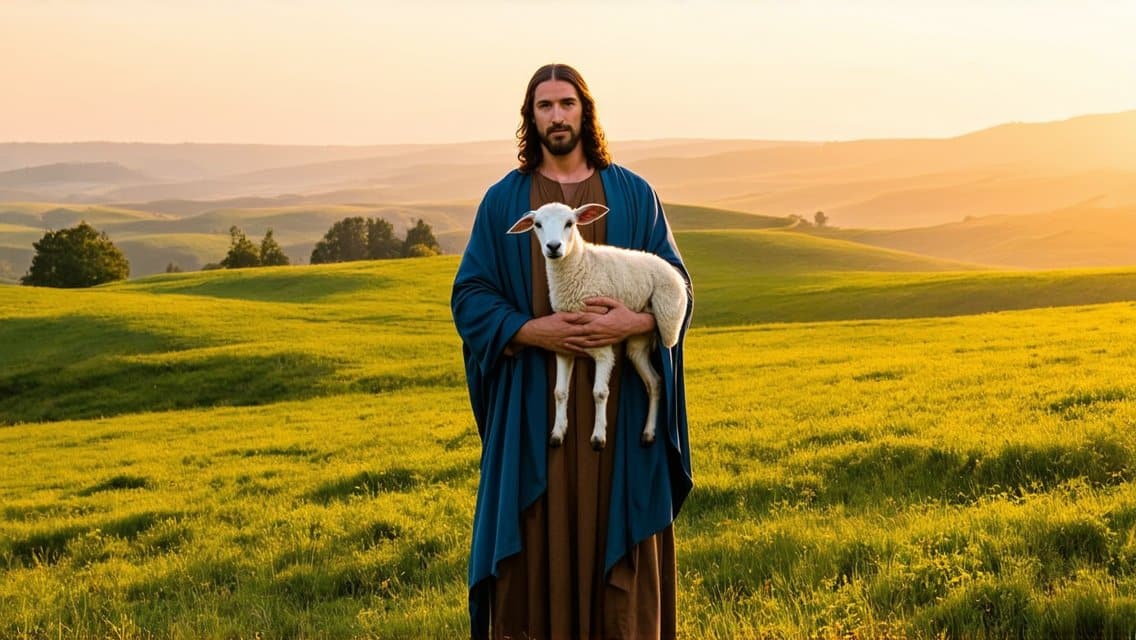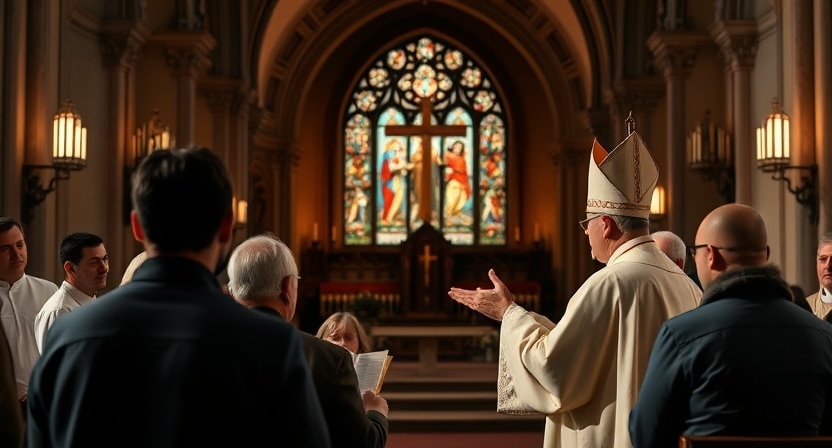FOURTH SUNDAY OF EASTER YEAR A
Christ the Good Shepherd
INTRODUCTION AND CONFITEOR
This Sunday is traditionally known as Good Shepherd Sunday. We will hear once more the words of that great psalm: ‘The Lord is my shepherd, there is nothing I shall want’.
Christ is our Good Shepherd. Let us pause to reflect ‘on his unfailing love for us. [Pause]
Lord, you are our shepherd, there is nothing we shall want. Lord, have mercy.
Even if we should walk in the valley of darkness, we will fear no evil, because you are with us. Christ, have mercy.
In your own house we will dwell for ever and ever. Lord, have mercy.
READINGS FOR READINGS
First Reading (Acts 2:14,36-41). This is the conclusion of the sermon preached by Peter on the day of Pentecost. He tells the people that Jesus, whom they crucified, has been raised up and is now the Lord. Many of his hearers repent of their sins and accept Baptism.
Second Reading (1 Peter 2:20-25). This was addressed to slaves. Peter urges them to bear their unjust sufferings with patience, as Christ, the Good Shepherd, bore his sufferings for love of us.
Gospel (John 10:1-10). Jesus compares his love for his disciples to the love of a shepherd for his sheep.
1st Reading – Acts 2:14A, 36-41
14A But Peter standing up with the eleven, lifted up his voice, and spoke to them:
36 Therefore let all the house of Israel know most certainly, that God has made both Lord and Christ, this same Jesus, whom you have crucified.
37 Now when they had heard these things, they were cut to the heart, and said to Peter, and to the rest of the apostles: What shall we do, men and brethren?

38 But Peter said to them: Do penance, and be baptized every one of you in the name of Jesus Christ, for the remission of your sins: and you shall receive the gift of the Holy Ghost.
39 For the promise is to you, and to your children, and to all that are far off, whomsoever the Lord our God shall call.
40 And with very many other words did he testify and exhort them, saying: Save yourselves from this perverse generation.
41 They therefore that received his word, were baptized; and there were added in that day about three thousand souls.
Responsorial Psalm – Psalms 23: 1-3a, 3b, 4, 5, 6
R. (1) The Lord is my shepherd; there is nothing I shall want.
or:
R. Alleluia.
1 The LORD is my shepherd; I shall not want.
2 In verdant pastures he gives me repose;
beside restful waters he leads me;
3A he refreshes my soul.
R. The Lord is my shepherd; there is nothing I shall want.
or:
R. Alleluia.
3BC He guides me in right paths
for his name’s sake.
4 Even though I walk in the dark valley
I fear no evil; for you are at my side.
With your rod and your staff
that give me courage.
R. The Lord is my shepherd; there is nothing I shall want.
or:
R. Alleluia.
5 You spread the table before me
in the sight of my foes;
you anoint my head with oil;
my cup overflows.
R. The Lord is my shepherd; there is nothing I shall want.
or:
R. Alleluia.
6 Only goodness and kindness follow me
all the days of my life;
and I shall dwell in the house of the LORD
for years to come.
R. The Lord is my shepherd; there is nothing I shall want.
or:
R. Alleluia.
2nd Reading – 1 Peter 2:20B-25
20B Beloved: If you are patient when you suffer for doing what is good, this is a grace before God
21 For unto this are you called: because Christ also suffered for us, leaving you an example that you should follow his steps.
22 Who did no sin, neither was guile found in his mouth.
23 Who, when he was reviled, did not revile: when he suffered, he threatened not: but delivered himself to him that judged him unjustly.
24 Who his own self bore our sins in his body upon the tree: that we, being dead to sins, should live to justice: by whose stripes you were healed.
25 For you were as sheep going astray; but you are now converted to the shepherd and bishop of your souls.
Alleluia – John 10:14
R. Alleluia, alleluia.
14 I am the good shepherd, says the Lord;
I know my sheep, and mine know me.
R. Alleluia, alleluia.
Gospel – John 10:1-10
1 Jesus said: “Amen, amen I say to you: He that enters not by the door into the sheepfold, but climbs up another way, the same is a thief and a robber.
2 But he that enters in by the door is the shepherd of the sheep.
3 To him the gatekeeper opens; and the sheep hear his voice: and he calls his own sheep by name, and leads them out.
4 And when he has let out his own sheep, he goes before them: and the sheep follow him, because they know his voice.
5 But a stranger they follow not, but fly from him, because they know not the voice of strangers.
6 This proverb Jesus spoke to them. But they understood not what he spoke to them.
7 Jesus, therefore, said to them again: Amen, amen I say to you, I am the door of the sheep.
8 All others, as many as have come, are thieves and robbers: and the sheep heard them not.
9 I am the door. By me, if any man enter in, he shall be saved: and he shall go in, and go out, and shall find pastures.
10 The thief comes not, but for to steal, and to kill, and to destroy. I am come that they may have life, and may have it more abundantly.
HOMILY
Today’s Gospel provides us with one of the loveliest images of Christ, namely, that of the Good Shepherd. No one can read Chapter Ten of John’s Gospel without being moved. What do we mean by a good shepherd? The question is almost unnecessary. When we hear the words ‘good shepherd’ we immediately think of someone who cares, especially about the weak and the lost. The best thing is to give an example. An example always speaks to us.
The scene was a little village in the Swiss Alps. A Russian prince was being treated for tuberculosis in the local clinic. At first the children of the village (of whom there were about forty) made fun of him because he was big, clumsy, and strange. But gradually he won them over by his interest in them and friendliness towards them. He did not teach them; they had a school master for that. But he spent all his time with them. Their parents were sometimes worried that he might be putting bad ideas into their heads, and the school master was jealous of the influence he had over them.
Now in the village there also lived a poor and unfortunate girl called Marie. Marie lived in a ramshackle house with her mother who was an invalid. She was twenty years old, but was very weak and thin, having contracted tuberculosis when she was a child. Yet she was forced to go from house to house, scrubbing floors and washing dishes. A passing commercial traveller took her away, seduced her, and then abandoned her. She returned home, mud-spattered and in rags, to be rejected as disgraced by all the villagers. Some blamed her. Others scolded her. The children threw mud and stones at her.
It was at this point that the prince began to befriend her. For a while he lost the children as a result. Marie hired herself out as a cowherd and stayed away from the village as much as possible, eating only a little bread and cheese. Her mother died. As Marie stood by the coffin in church, the priest passed some disparaging remarks about her.
But soon after this a lovely thing happened. Thanks to the reasoning and example of the prince, the children too began to love and befriend Marie. They started to visit her, bringing her food, clothes, shoes, and other things. The prince was now accused of corrupting the children, who were forbidden to visit Marie. However, they continued to visit her secretly. For the first time in her life Marie began to smile and feel happy.
But it was clear that her health was declining. The time came when she hadn’t the strength to go out herding, and had to remain at home alone in her deserted cottage. Soon she was forced to stay in bed. She was dying. The children nursed her with touching care and tenderness. The villagers no longer had the heart to forbid them.
They stayed with her until she breathed her last, and saw to it that she had a beautiful funeral. They packed the tiny church. Then they vied with one another to carry her coffin. Afterwards they planted roses all around her grave. When finally the time came for the prince to return to his native Russia, all the children turned up at the railway station to see him off. They did their best not to cry, but few were successful. They stayed on the platform waving until the train was out of sight.
Here we not only see the innate goodness of children (which however needs to be awakened and encouraged), but we see a good shepherd in action. The prince was a good shepherd to those children. Good shepherds do not think of themselves, nor are they influenced by the neglect and prejudice they find around them. They are interested only in their sheep. No danger, no difficulty is too great to be faced and overcome.
Such a caring attitude, however, goes against the prevailing attitudes of the day. We live in a world where, by and large, the name of the game is: look after your own interests, because if you don’t, no one else will. In our schools it is the bright kids who get most attention. Naturally these are the most successful ones, and are smothered with medals. The failures, on the other hand, not only go away empty-handed, but are forgotten. Now there is talk of getting rid of the very old, the senile, and the terminally ill. Also there is talk (it is already happening) of getting rid of the unborn child who, it is feared, may be born handicapped. And the reason for all this is that people are not willing to care.
We need good shepherds today in every walk of life. In our homes we need parents who really care about their children, who spend time with them, and who still care for them even when they disappoint them. In our schools we need teachers who know their pupils and who take a personal interest in their well-being. In our hospitals we need doctors and nurses who care about their patients and who do not treat them as objects. In public life we need people who care about the welfare of others rather than their own selfish interests. And of course in the Church we need priests who are willing to give a loving service to all their brothers and sisters.
Today we are asked to pray for vocations to the priesthood and religious life. This we should do. But we should not forget that all Christians have a fundamental vocation to be loving and caring people. In other words, to try in their own lives to extend to others the love of Christ, the Good Shepherd, which they themselves have experienced.
‘Frequently we despise everything Christ loved, everything marked with his compassion’. (Thomas Merton).
‘It’s no good talking, one has to set an example’. (Dostoyevsky).
PRAYER OF THE FAITHFUL
Jesus cared for his disciples and for the people at large as a good shepherd cares for his sheep. Let us pray that we his followers may continue his work of shepherding in the Church and in the world. R. Lord, hear our prayer.
For all Christian leaders: that they may be true shepherds to their flocks, supporting the weak ones, guiding the wayward ones, and encouraging the steady ones. [Pause] We pray to the Lord. For all those who hold public office: that they may not be mere hirelings who put their salaries before service to others. [Pause] We pray to the Lord.
For parents, teachers, priests, and other leaders: that they may be true shepherds to those in their care. [Pause) We pray to the Lord.
That all of us, no matter what our state in life, may realise that we can imitate the Good Shepherd by the love we show for others. [Pause] We pray to the Lord.
For vocations to the priesthood and religious life: that more people may hear the call to become shepherds to the flock of Christ. Pause] We pray to the Lord.
For local needs.
Let us pray:
Father, Christ your Son came that we might have life, and have it to the full. Help us to listen to his voice, so that he can guide us along the path that leads to eternal life. We ask this through the same Christ our Lord.
COMMUNION REFLECTION
There is a story told that one day Christ
came upon a shepherd who was overcome with sorrow.
‘Why are you so sad?’ he asked.
‘Because I have lost one of my sheep,’ the man replied,
‘and though I have looked all over for it,
I have not found it. It may be
that the wolf has already devoured it.’
Then Christ said: ‘Wait here.
I will look for the sheep myself.’
With that he disappeared into the hills.
An hour later he returned with the sheep.
Putting it down at the shepherd’s feet he said:
‘From this day on you must love this sheep
more than any other in your flock,
for it was lost and now has been found.’
St Peter says to us [cf. Second Reading]:
‘Once you had all gone astray like sheep,
but now you have come back to Christ,
the shepherd and guardian of your souls.’
We are all the more precious to Christ
because he had to go to the trouble
of looking for us and finding us.


